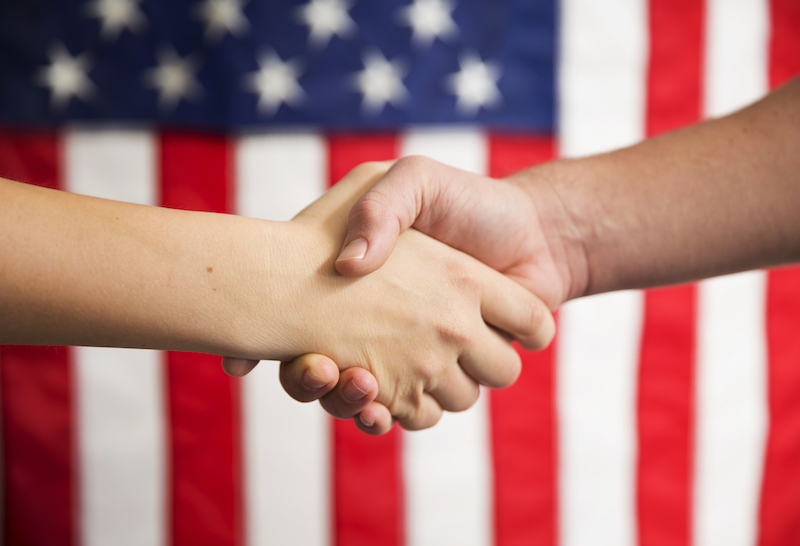Editors’ note: This year’s election season clearly revealed what many have long suspected: America is a deeply divided nation. What has caused this division? What is the way forward? How can evangelicals respond in a way that leads to healing and increased unity? The Gospel Coalition invited several writers and observers to explore those and related questions for an online symposium on the State of Evangelicalism.
Other articles in this series:
- What Persecuted Syrians Can Teach Us About American Politics (Mindy Belz)
- 4 Unique Perspectives on Politics (Mika Edmondson)
- Powerful Witness from a Position of Weakness (Bruce Ashford)
- Hope for America Despite Signs of Death (Greg Forster)
- 4 Suggestions for Post-Election Listening (Eric Redmond)
- Caught Between Doomsday Rhetoric and Changing Demographics (Mark Tooley)
- Raise Up a Transcendent Voice in a Partisan World (K. A. Ellis)
An election that seemed to drag on through most of Barack Obama’s second term has finally ended. Contrary to many crystal balls (mine certainly has cracks in it), Donald Trump prevailed. The long campaign has left conservative evangelicals more divided politically than at any other time in recent decades. Where do we stand relative to each other now? And how should we think about going forward?
Jerry Falwell Jr. was an early adopter on Trump, but it was more typical for conservative Christians to support Trump after a process of elimination. Ben Carson, James Dobson, and many others eventually backed his campaign. At the same time, many evangelicals chose the #NeverTrump option. Russell Moore of the Southern Baptist Ethics and Religious Liberty Commission, Albert Mohler of Southern Seminary, and conservative broadcaster Erick Erickson all fit that description.
As a person who never quite made it to #NeverTrump, but whose close friends tended to be in that camp, I saw both sides. (My own frustration with the campaign led me to investigate the possibilities for European-style Christian Democracy in the United States, which has become an ongoing personal project.)
Case for #NeverTrump
The #NeverTrumpers had two (and maybe three) significant parts to their case. First, they believed that Trump lacked the character to be president and that Christians should not support him. They pointed to his multiple marriages, his sexual history, his ownership of casinos, and his record of questionable business ethics to support their claim. Second, many believed he wouldn’t advance Christian interests in politics. They didn’t think he could be trusted to provide any real impetus to the causes of life and religious liberty. At the same time, they felt his ardent nationalism and anti-immigration emphasis ran directly counter to a faith that insists on the brotherhood and sisterhood of men and women and a church that is fully global in scope. Finally, the great majority of #NeverTrumpers were certain he would underperform and carry the Republican Party to historic defeat, thus simultaneously blocking more worthy standard-bearers and leaving the coalition worse off.
Those who found a way to support Trump (or at least managed to pull the lever for him) looked to the open seat on the Supreme Court and the several thousand appointed positions a new president would fill, and reasoned their political concerns would be more likely vindicated (or at least less damaged) by a President Trump than by a President Clinton.
The two camps criticized each other aggressively. The #NeverTrump group pilloried those who accommodated to Trump for being easily taken in, for compromising the gospel for worldly success, and for destroying whatever value the Christian conservative movement had as a force in American politics. Those who ultimately supported Trump (often after having no other Republican option outside of the previously anonymous Evan McMullin) decried the inability of #NeverTrumpers to grasp that political reality would dictate that causes such as life and religious liberty would almost have to be better off with a Trump presidency than a Clinton one, if for no other reason than the nature of the constituencies involved and the identities of likely appointees.
Case for Compromise
In retrospect, I think it’s difficult to contest the claim that those who accommodated themselves to the president-elect had a better argument than their opponents were willing to admit. In particular, I recall one young evangelical spending many thousands of words arguing that there was absolutely no case for Trump in terms of either life or religious liberty. Given the normalcy of the great majority of Trump’s cabinet appointments so far, it seems likely voices such as Mariam Bell (Ronald Reagan’s religious liaison and a long-time presence at Values Action Team meetings) were correct to say the New York real estate magnate would have little choice other than to offer Washington jobs to largely faith-friendly conservatives and Republicans.
With a Hillary Clinton presidency, there was a significant possibility Christian colleges and universities would lose access to federal aid for their students in the form of student loans, Pell grants, and veteran’s benefits as a consequence of the Obergefell decision. It wouldn’t be difficult for the Department of Education to issue such a ruling in the same way the Department of Health and Human Services mandated the inclusion of birth control and abortifacients in employer-sponsored health coverage. With a Trump victory, there is virtually no chance that, say, Secretary of Education Betsy DeVos would allow such an adverse rule to come from her department.
It also appears religious conservatives will gain breathing room, since Trump’s win possibly derails what would’ve been a generational change in the direction of the Supreme Court. There is now a much higher chance that the pro-religious-liberty contingent on the Court may gain strength. While Obergefell won’t be reversed, its potential fallout can now be contained and slowed. We could go on at some length in this vein, but the point is evident. In my opinion, the supposed naïveté of the Trump conciliators was oversold.
Time to Reconcile

None of this represents an ultimate judgment that reluctant Trump allies were right and #NeverTrumpers were wrong. But it seems the reason Christian Trump supporters gave is being borne out as the next administration takes shape.
There are substantial concerns raised by the #NeverTrumpers, however, that are not dissolved by his victory. The honor of the presidency will go to a thrice-married man who participated in the morally dubious Trump University and who navigated the business world with sharp elbows and the occasional bankruptcy. It’s harder than ever to argue that upright personal character is critical to the office of president. More significant still is the challenge of reconciling a thoroughgoing Christian worldview with a program centered on economic nationalism and border control. Perhaps with the immediate threats of a major shift in the nature of the Supreme Court and an increasingly adverse federal bureaucracy now muted to some degree, it will be possible for conservative evangelicals, Roman Catholics, and others to reunite in such a way as to edify American political culture.
Along those lines, I want to emphasize the importance of the two sides respecting one another and not seeking to engage in worldly settling of scores. Christians on both sides of the Trump question (and by extension, the Clinton question) had good reason to believe as they did and to act in accordance with those beliefs. If anything, the failure wasn’t to have debated, but to have often debated unkindly or disrespectfully and given light regard to brothers, sisters, and longtime comrades in arms.
The Religious Right isn’t over, but it must meet the challenge of getting better. And part of getting better is remembering that the fight was conducted for the good of our fellow citizens and for our country—not for the purpose of defeating each other.
Is there enough evidence for us to believe the Gospels?
 In an age of faith deconstruction and skepticism about the Bible’s authority, it’s common to hear claims that the Gospels are unreliable propaganda. And if the Gospels are shown to be historically unreliable, the whole foundation of Christianity begins to crumble.
In an age of faith deconstruction and skepticism about the Bible’s authority, it’s common to hear claims that the Gospels are unreliable propaganda. And if the Gospels are shown to be historically unreliable, the whole foundation of Christianity begins to crumble.



































